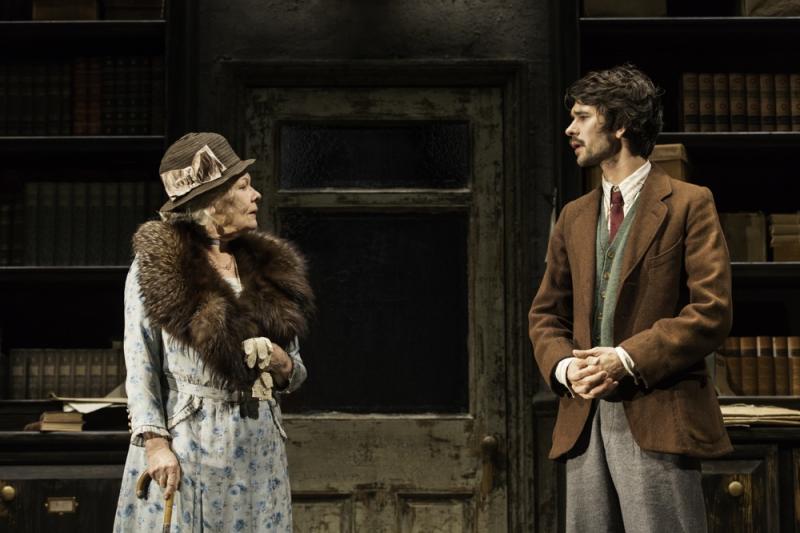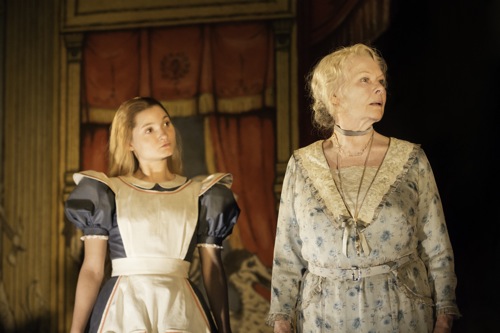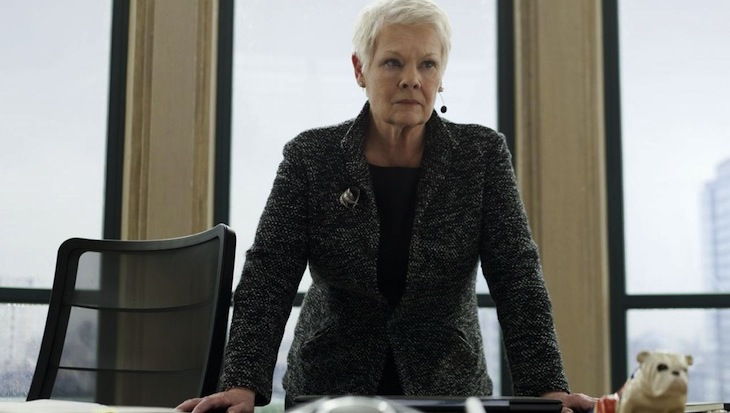Peter and Alice, Noël Coward Theatre | reviews, news & interviews
Peter and Alice, Noël Coward Theatre
Peter and Alice, Noël Coward Theatre
Judi Dench and Ben Whishaw step through the looking glass in Michael Grandage's elegiac production of John Logan's new play

What becomes of children “born out of sadness and loneliness”, exiled from Wonderland or Neverland, longing for remembered golden afternoons, but forced to confront the chilly twilight of adulthood? This new play by John Logan brings Alice Liddell and Peter Llewelyn Davies – the real-life inspirations for Lewis Carroll’s Alice books and JM Barrie’s Peter Pan – face to face, not just which each other, but with their creators and their fictional selves.
Logan’s 90-minute drama – the second work in the inaugural season by the Michael Grandage Company – is poetic and achingly wistful, with echoes of nursery rhyme and cockeyed, rocking-horse rhythms. It has an eddying fluidity and perilously languid pace, yet both the writing and Grandage’s finely detailed production reward close attention. And the cast, led by Skyfall co-stars Judi Dench and Ben Whishaw, conjure a potent, melancholy magic.
The real Alice and Peter met at a Lewis Carroll exhibition in 1932, and it is this encounter that Logan reimagines. In a book-crammed storeroom, Whishaw’s Peter prepares anxiously to greet Alice and his public. With its dirty glass skylight and the burble of voices from the gallery beyond, the room has an aquarium-like, underwater eeriness. Whishaw’s demeanour is suffused with a forlorn, defeated quality; he looks vulnerable, anguished, brittle. Dench’s octogenarian Alice, by contrast, retains a glittering glamour. In a dress whose flounces recall the child she once was, she’s imperious and yearning by turns, the woman forced by economic necessity to capitalise on her mythologised youth vying with the romantic little girl who basked in Carroll’s rapt attention while being discomfited by its intensity.
 As the pair’s memories resurface and their young alter egos reassert themselves, Christopher Oram’s masterly set opens up like a marvellous toybox, disgorging layer after layer of storybook wonders. The drab storeroom flies away, revealing a giant toy theatre decorated with Tenniel-inspired illustrations. The Mad Hatter and the Red Queen perch in boxes; the Cheshire Cat grins from atop the proscenium. Here, Wonderland Alice in her blue frock and apron (Ruby Bentall, pictured above with Dench) and puckish Peter Pan (Olly Alexander) offer their wicked and unsparing, child’s-eye verdicts on the grown-ups Liddell and Llewelyn Davies have become.
As the pair’s memories resurface and their young alter egos reassert themselves, Christopher Oram’s masterly set opens up like a marvellous toybox, disgorging layer after layer of storybook wonders. The drab storeroom flies away, revealing a giant toy theatre decorated with Tenniel-inspired illustrations. The Mad Hatter and the Red Queen perch in boxes; the Cheshire Cat grins from atop the proscenium. Here, Wonderland Alice in her blue frock and apron (Ruby Bentall, pictured above with Dench) and puckish Peter Pan (Olly Alexander) offer their wicked and unsparing, child’s-eye verdicts on the grown-ups Liddell and Llewelyn Davies have become.
Two figures in black – Nicholas Farrell’s Carroll (real name Reverend Charles Dodgson) and Derek Riddell’s Barrie – loom as large as the monstrous shadows that Paule Constable’s eloquent lighting sends stalking through the gaily painted scenes, emotionally inadequate, always demanding more of the children they idolised than they could possibly give, their affection becoming a tyranny. And nightmarish fragments of the past swim into view: Peter’s throat-cancer afflicted father, a horror worse than any pirate to his children, with his grotesque leather prosthetic jaw; the wholesale slaughter of the Great War; the death of innocence, hope and the heart’s desire. “I wanted to be an independent woman, like Jane Austen. I wanted to be a poetess. I wanted so much,” remembers Alice, who submitted instead to a life of stultifying marriage and whalebone corsets.
Logan’s writing is filled with arresting images. Llewelyn Davies, irreparably shattered by the war, describes his life pooling around his feet, as if he were a broken Humpty Dumpty – a motif echoed in the lake of tears shed by Carroll’s Alice, and in the drowning of Peter’s younger brother. But the play is more than an artful game, or a meditation on literary immortality. It is an elegy for the lost dreams of childhood, for squandered potential, a cry for love and the desperate desire to be thought of as special. It has something of the desolate feel of a deserted playroom; and yet it’s also, in its quiet, rueful way, rather beautiful.
DAME JUDI DENCH ON THEARTSDESK
A Midsummer Night's Dream, Rose Theatre (2010). Judi Dench is a glorious Gloriana in Peter Hall's flat production
Jane Eyre (2011). Dench plays kindly housekeeper to Mr Rochester in invigorating version of the novel with Michael Fassbender and Mia Wasikowska
Skyfall (2012). Dench's M (pictured) is written out of the franchise in possibly the best ever Bond movie
The Best Exotic Marigold Hotel (2012). The Dames have it in John Madden's tale of British travellers abroad
 J. Edgar (2012). Dench as Hoover's mother lacks commitment to her American accent in flawed Eastwood biopic
J. Edgar (2012). Dench as Hoover's mother lacks commitment to her American accent in flawed Eastwood biopic
Philomena (2013). Judi Dench touches the heart once again in the Dame's latest bid for Oscar glory
Spectre (2015). Dench's M cameos in a video message beyond the grave as Daniel Craig and Sam Mendes carry on without her
The Second Best Exotic Marigold Hotel (2015). The expats are back in that rare sequel that betters its predecessor
The Winter's Tale, Garrick Theatre (2015). Judi Dench brings gravitas to Kenneth Branagh's West End season opener
The Hollow Crown: The Wars of the Roses - Richard III (2016). Dench is a matchless veteran opposite Benedict Cumberbatch chills's crook-backed king
rating
Explore topics
Share this article
The future of Arts Journalism
You can stop theartsdesk.com closing!
We urgently need financing to survive. Our fundraising drive has thus far raised £49,000 but we need to reach £100,000 or we will be forced to close. Please contribute here: https://gofund.me/c3f6033d
And if you can forward this information to anyone who might assist, we’d be grateful.

Subscribe to theartsdesk.com
Thank you for continuing to read our work on theartsdesk.com. For unlimited access to every article in its entirety, including our archive of more than 15,000 pieces, we're asking for £5 per month or £40 per year. We feel it's a very good deal, and hope you do too.
To take a subscription now simply click here.
And if you're looking for that extra gift for a friend or family member, why not treat them to a theartsdesk.com gift subscription?
more Theatre
 Hamlet, National Theatre review - turning tragedy to comedy is no joke
Hiran Abeyeskera’s childlike prince falls flat in a mixed production
Hamlet, National Theatre review - turning tragedy to comedy is no joke
Hiran Abeyeskera’s childlike prince falls flat in a mixed production
 Rohtko, Barbican review - postmodern meditation on fake and authentic art is less than the sum of its parts
Łukasz Twarkowski's production dazzles without illuminating
Rohtko, Barbican review - postmodern meditation on fake and authentic art is less than the sum of its parts
Łukasz Twarkowski's production dazzles without illuminating
 Lee, Park Theatre review - Lee Krasner looks back on her life as an artist
Informative and interesting, the play's format limits its potential
Lee, Park Theatre review - Lee Krasner looks back on her life as an artist
Informative and interesting, the play's format limits its potential
 Measure for Measure, RSC, Stratford review - 'problem play' has no problem with relevance
Shakespeare, in this adaptation, is at his most perceptive
Measure for Measure, RSC, Stratford review - 'problem play' has no problem with relevance
Shakespeare, in this adaptation, is at his most perceptive
 The Importance of Being Earnest, Noël Coward Theatre review - dazzling and delightful queer fest
West End transfer of National Theatre hit stars Stephen Fry and Olly Alexander
The Importance of Being Earnest, Noël Coward Theatre review - dazzling and delightful queer fest
West End transfer of National Theatre hit stars Stephen Fry and Olly Alexander
 Get Down Tonight, Charing Cross Theatre review - glitz and hits from the 70s
If you love the songs of KC and the Sunshine Band, Please Do Go!
Get Down Tonight, Charing Cross Theatre review - glitz and hits from the 70s
If you love the songs of KC and the Sunshine Band, Please Do Go!
 Punch, Apollo Theatre review - powerful play about the strength of redemption
James Graham's play transfixes the audience at every stage
Punch, Apollo Theatre review - powerful play about the strength of redemption
James Graham's play transfixes the audience at every stage
 The Billionaire Inside Your Head, Hampstead Theatre review - a map of a man with OCD
Will Lord's promising debut burdens a fine cast with too much dialogue
The Billionaire Inside Your Head, Hampstead Theatre review - a map of a man with OCD
Will Lord's promising debut burdens a fine cast with too much dialogue
 50 First Dates: The Musical, The Other Palace review - romcom turned musical
Date movie about repeating dates inspires date musical
50 First Dates: The Musical, The Other Palace review - romcom turned musical
Date movie about repeating dates inspires date musical
 Bacchae, National Theatre review - cheeky, uneven version of Euripides' tragedy
Indhu Rubasingham's tenure gets off to a bold, comic start
Bacchae, National Theatre review - cheeky, uneven version of Euripides' tragedy
Indhu Rubasingham's tenure gets off to a bold, comic start

Add comment